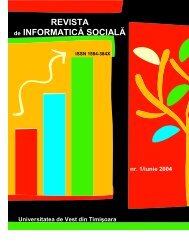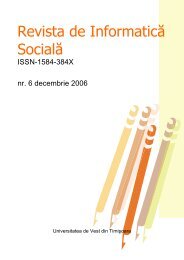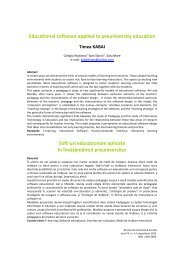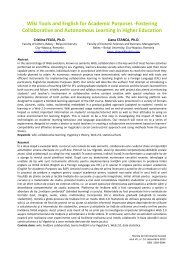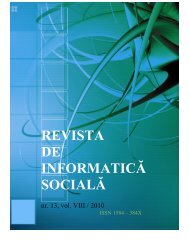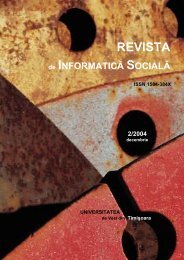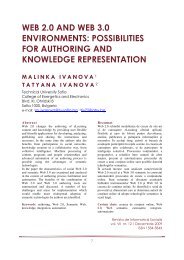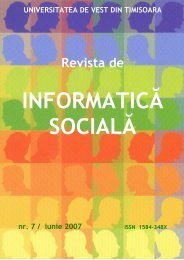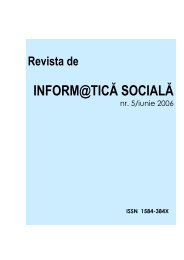An additional dimension to the four principles is to encourage mechanisms through whichinstitutions and stu<strong>de</strong>nts can strengthen the linkages between learning and economic returns. Whilethis does call for a strengthening <strong>of</strong> vocational programs that have been gutted in the U.S. over thepast <strong>de</strong>ca<strong>de</strong>s, it also means providing mechanisms for learners to engage in practical experiencesthat are groun<strong>de</strong>d in team building, communication, innovation and entrepreneurship – the veryskills that many U.S. employers find lacking; their absence is adding to the storm clouds facing theU.S. [24]. Fortunately, community-based learning experiences provi<strong>de</strong> the mechanisms forembedding these experiences into the lives <strong>of</strong> learners.The same sorts <strong>of</strong> embed<strong>de</strong>d predictive analytics that are comparing stu<strong>de</strong>nt performance withsuccessful stu<strong>de</strong>nts in the past may be applied to employability and workforce success in the future.We Conclu<strong>de</strong> on a Hopeful <strong>No</strong>te. The emerging combination <strong>of</strong> institutional and open learningexperiences and options will provi<strong>de</strong> both new pathways and mechanisms for exploitingorganizational processes that add value (as with some <strong>of</strong> the knowledge flows in online learning),and discovering fresh approaches to learning and competence building.These fresh approaches will be critical to reaching the goals that have been set for America –merely extrapolating existing approaches will prove too costly and unworkable. To achieveAmerica’s goals, learning enterprises need to increase their productivity, for example throughstrategic <strong>de</strong>ployment <strong>of</strong> the insights that they gained in past innovations, but have notinstitutionalized as yet. This will help them to <strong>de</strong>liver greater value, to more stu<strong>de</strong>nts, with lesseffort, and at lower cost.ABOUT THE AUTHORSDr. Donald NORRIS, Presi<strong>de</strong>nt <strong>of</strong> Strategic Initiatives, is recognized as a thought lea<strong>de</strong>r andskilled practitioner in <strong>de</strong>velopmental consulting for institutions, states, Ministries <strong>of</strong> Education andother knowledge enterprises that are striving to re-imagine learning and work in the aftermath <strong>of</strong> theGreat Recession and the realignment <strong>of</strong> processes and practices in its wake.Dr. Paul LEFRERE <strong>of</strong> Strategic Initiatives is also Senior Research Fellow at the OpenUniversity <strong>of</strong> the UK (Knowledge Media Institute) and Pr<strong>of</strong>essor <strong>of</strong> eLearning at the University <strong>of</strong>Tampere, Finland (Vocational Learning and e-skills Centre). Previously, he was Executive Directorfor eLearning at Micros<strong>of</strong>t.
In collaboration with Strategic Initiatives’ other consultants and partners, Drs. <strong>No</strong>rris and Lefrereare involved in a wi<strong>de</strong> range <strong>of</strong> projects globally that are finding new ways to leverage the e-Lifestyle to advance learning, entrepreneurship, innovation, commercialization <strong>of</strong> new i<strong>de</strong>as andcommunity problem solving. These projects involve leveraging open resources, practices andinnovations, combining them with pay-for-use mo<strong>de</strong>ls. They also involve addressing and advancingthe different approaches required for knowledge pathways and knowledge gaps. <strong>No</strong>rris and Lefrereare nurturing partnerships, globally, between universities, commercial enterprises, governments andcommunities to advance learning, work and entrepreneurship.As applied to the United States, our <strong>de</strong>velopmental consulting practice translates into the goal <strong>of</strong>increasing the productivity and flexibility <strong>of</strong> the educational system and the benefits that come fromthis, while reducing system costs. A key element is increasing the percentage <strong>of</strong> Americans whobenefit economically and educationally from acquiring and refreshing high-value <strong>de</strong>grees,cre<strong>de</strong>ntials, certificates, and <strong>de</strong>monstrated competences throughout productive lives.REFERENCES1. <strong>No</strong>rris, D.M. & M.D. Dolence. Transforming Higher Education, A Vision for Learning in the 21stCentury, Ann Arbor: Society for College and University Planning, 1995.2. Baumol, W.J & S.A.B. Bateman. “How to Think About Rising College Cost” in Planning for HigherEducation, Volume 23(4), 1-7, Summer 1995.3. Twigg, C. Course Re-<strong>de</strong>sign Initiatives, National Center for Aca<strong>de</strong>mic Transformation. Available:www.thencat.org.4. Mayadas, F.A. Speech at 15th Annual Meeting, Sloan C Consortium, October, 2009.5. <strong>No</strong>rris, D.M. “Driving Systemic Change with e-Learning” in: Caroline Howard, Judith V. Boettcher,Lorraine Justice, Karen Schenk, Patricia L. Rogers, and Gary A. Berg (Eds.), Encyclopedia <strong>of</strong>Distance Learning, I<strong>de</strong>a Group, Hershey, PA, 687-695, 2005.6. <strong>No</strong>rris, D.M. & L. Baer. “Linking Analytics to Lifting out <strong>of</strong> Recession,” White Paper. Available:http://www.strategicinitiatives.com/documents/Linking_Analytics_26sep09.pdf.7. Green, K.C. “Managing Online Programs,” presentation at WCET Meeting, October 28, 2009.8. Jan, T. “UMass Will Offer 3-Year Degree Plan,” The Boston Globe, September 27, 2010.9. LeBlanc, C. “Reinventing the Aca<strong>de</strong>my: Transforming for New Learners, Digital Technologies, AndStu<strong>de</strong>nt Success,” Reinventing the University: New Mo<strong>de</strong>ls & Innovations for 21 st Century Realities,New England Board <strong>of</strong> Higher Education, October 4, 2010.10. Smith, P. Harnessing America’s Wasted Talent: A New Ecology for Learning. San Francisco:Jossey-Bass, 2010.11. Christensen, C.M., M.P. Horn and C.W. Johnson, Disrupting Class: How Disruptive Innovation WillChange the Way the World Learns (Expan<strong>de</strong>d Edition). Harvard Business School Press, 2010.12. <strong>No</strong>rris, D.M. and L. Ramsayer. Ínterview with Lee Ramsayer, Monster.com, “What’s New inAnalytics?” http://www.edu1world.org/PublicForumActionAnalytics/wiki/document/278613 Kamenetz, A. “DIY U: Edupunks, Edupreneurs, and the Coming Transformation <strong>of</strong> HigherEducation,” White River Junction, Vermont: Chelsea Green Publishing. 2010.<strong>14</strong>. <strong>No</strong>rris, D.M., J. Mason & P. Lefrere. Transforming eKnowledge: A Revolution in KnowledgeSharing, Ann Arbor: Society for College and University Planning, 2003.15. MSU Global Food Network. Available: http://FoodSafetyKnowledgeNetwork.org.16. Brown, J.S. & R.P. Adler. “Minds on Fire: Open Education, the Long Tail, and Learning 2.0” inEDUCAUSE Review, January/February 2009.17. ROLE Project. Available: http://www.role-project.eu, 2010.18. Knowledge Media Institute, UK Open University. Available: http://projects.kmi.open.ac.uk/osc/,2010.
- Page 1: Revista de Informatica Sociala 14 /
- Page 7: ● ● ●CONTENTS● ● ●[9-20
- Page 10 and 11: THE TRANSITION FROM OLD TO NEW MEDI
- Page 12 and 13: 30252023.420.325.11510500.85.5Never
- Page 14 and 15: Overall, we can therefore sum up on
- Page 16 and 17: n.a.I often use itI seldom use it6.
- Page 18 and 19: - Traditional web use: searching th
- Page 20 and 21: 19. Kvavik R.B., Caruso J.B. and Mo
- Page 22: IntroductionIn 1995, Bernie Dodge o
- Page 25 and 26: The Web-Inquiry Project [WIP] is a
- Page 27 and 28: and even orally. The teacher will a
- Page 29 and 30: environment in which the teacher gu
- Page 31 and 32: Transformation Through Online Learn
- Page 33 and 34: INTRODUCTIONLeading practitioners a
- Page 35 and 36: learning. We also describe how the
- Page 37 and 38: Some of these transformations are b
- Page 39 and 40: Recently, Twigg has received suppor
- Page 41 and 42: Stage III: Unbundled Learning, Mark
- Page 43 and 44: perhaps using Second Life-like virt
- Page 45 and 46: performance. Indeed, Stage V will l
- Page 47 and 48: Free-Range Open LearningOver time,
- Page 49 and 50: New communities, tools and services
- Page 51: Embed enterprise-wide predictive an
- Page 55 and 56: Wiki Tools and English for Academic
- Page 57 and 58: eality. Besides being an additional
- Page 59 and 60: StudentPage 1StudentPage nTeacher
- Page 61 and 62: 100%90%80%70%60%50%40%30%20%10%0%Ac
- Page 63 and 64: 200Correlation View/Page Edits150Vi
- Page 65 and 66: 14. http://eacea.ec.europa.eu/llp/s
- Page 67 and 68: Simularea şi comunicarea electroni
- Page 69 and 70: RespondenţiRăspunsuriLa nivelul
- Page 71 and 72: RespondenţiRăspunsuriLa nivelul
- Page 73 and 74: Respondenţii au fost rugaţi să i
- Page 75 and 76: Itemul 9 doreşte să identifice ti
- Page 77 and 78: Identificara opţiunii, chiar şi p
- Page 79 and 80: EşantioaneRăspunsuri/Ranguriagita
- Page 81 and 82: modalităţile practice prin care u
- Page 83 and 84: 1. INTRODUCEREÎn prezent, complexi
- Page 85 and 86: Figura 1. Analiza grafică a evolu
- Page 87 and 88: Faţă de această situaţie se deg
- Page 89 and 90: variabilele acesti noi culturi cybe
- Page 91 and 92: INTRODUCEREÎncă din anul 2000 am
- Page 93 and 94: după tipul lecţiei: prezentare de
- Page 95 and 96: Funcţiile oferite de AEL asigură
- Page 97 and 98: • elevi/studenţi, beneficiari di
- Page 99 and 100: Se poate folosi cadrul formal de co
- Page 102 and 103:
Evaluarea formativă este comentari
- Page 104 and 105:
Rezultatele elevilor, pe itemi:Diag
- Page 106 and 107:
Nr. Denumirea activităţii AEL MOO
- Page 108 and 109:
SEMNAL EDITORIALLaura MALITA, Vanna
- Page 110:
IN MEMORIAMConstantin TraianCHEVERE




